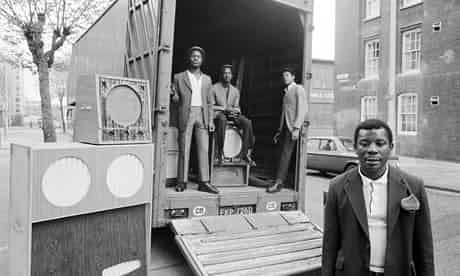The man who raised a black power salute at the 1968 Olympic Games
Friday 30th March 2012,
, Photograph: AP
You're probably not familiar with the name John Carlos. But you almost certainly know his image. It's 1968 at the Mexico City Olympics and the medals are being hung round the necks of Tommie Smith (USA, gold), Peter Norman (Australia, silver) and Carlos (USA, bronze). As the Star-Spangled Banner begins to play, Smith and Carlos, two black Americans wearing black gloves, raise their fists in the black power salute. It is a symbol of resistance and defiance, seared into 20th-century history, that Carlos feels he was put on Earth to perform.
Growing up black: Dennis Morris's portrait of the 70s
Monday 26th March 2012,
, Photograph: Dennis Morris
'The way we see things is affected by what we know and what we believe," wrote John Berger in Ways of Seeing. "The relation between what we see and what we know is never settled."
Trayvon Martin: a killing too far
Wednesday 21st March 2012,
, Photograph: Brian Blanco/EPA
The second world war had a civilising influence on Buford Posey, a white man raised in the Deep South during the Depression. "When I was coming up in Mississippi I never knew it was against the law to kill a black man," he says. "I learned that when I went in the army. I was 17 years old. When they told me I thought they were joking."
Illinois Republican primary result: Mitt Romney's tipping point
Wednesday 21st March 2012,
, Photograph: Jim Young/Reuters
Finally, after several months and untold millions of ad-spend dollars, the Republican party's "inevitable" nominee, Mitt Romney, acquired an aura of inevitability. Romney's emphatic victory in Illinois cannot be parsed. Exit polls point to a double-digit victory in a big state where he does not have a house, did not grow up and where all the candidates were participating. In this race, that qualifies as a big deal.
Rick Santorum's southern supremacy spells trouble for Mitt Romney
Wednesday 14th March 2012,
, Photograph: Mike Stone/Reuters
Finally, the Republican primary season has a nominee. Not for the presidency – the results from the Deep South on Tuesday night mean that contest will drag on and may, indeed, now intensify – but for conservative standard-bearer.
Romney and Santorum: Two Faces of GOP Capitalism
Wednesday 14th March 2012,
Studs Terkel's study of race in the US: 20 years on
Tuesday 13th March 2012,
, Photograph: Molly Riley/AP/PA Photos
Cultures do not come by their obsessions lightly. They tend them over generations, feeding them with myths, truths, pain, resentment, collective generalisations and individual exceptions. They pick at them like scabs until they bleed, and then mistake the consequent infection for the original wound. And then, like a hardy virus, the obsessions survive all attempts at inoculation by mutating into new and more stubborn strains.
Obama is still in a hole. It may yet be deeper than his Republican rivals'
Sunday 11th March 2012,
, Photograph: Jim Watson/AFP/Getty Images
Last Wednesday the Federal Reserve announced the first quarterly rise in consumer borrowing since 2008, bringing it close to pre-recession levels. The next day Mitt Romney, the frontrunner for the Republican presidential nomination, was on the stump in Pascagoula (population: 23,677). "If the federal government were run more like the government here in Mississippi," he told the inhabitants of America's poorest state where infant mortality is on a par with Botswana, "the whole country would be a lot better off".
For Obama to apologise for US mistakes is not un-American
Friday 9th March 2012,
, Photograph: Jim Young/Reuters
It's funny how, among Republicans, George W Bush doesn't come up. It's been less than four years. Yet, neither in debates, nor on the stump, nor even in the crowd, does the name of the man who held the job for eight years merit a mention.
Mitt Romney still can't seal the deal on Super Tuesday
Wednesday 7th March 2012,
, Photograph: Jessica Rinaldi/Reuters
There are some things, even in American electoral politics, that money can't buy. It can get an organisation, ads and attention. But it cannot make you engaging, compelling or authentic. In short, it can't buy you love. And as Mitt Romney keeps showing, week after week, if the voters don't really like you, then you just have to spend as much money as you can making sure they don't like anybody else either.
Affirmative action and the real enemy of education equality
Friday 2nd March 2012,
, Photograph: Susan Walsh/AP
In 1997, Patrick Hamacher applied to study undergraduate medicine at the University of Michigan, Ann Arbor and was rejected. Hamacher, one of whose parents had studied at the university, believed he had been denied a place because he was white. At the time, the university used a points system when selecting applicants, and those from under-represented minorities automatically received extra points. Hamacher later said he agreed with the aim of diversity, but that the university's methods amount to "artificially engineering and discriminating against others – and that is just not right."










